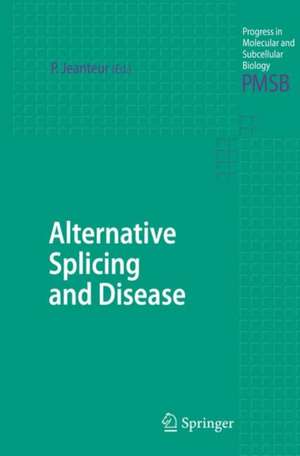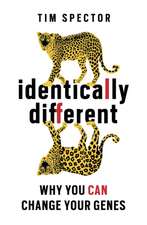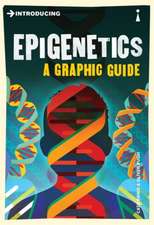Alternative Splicing and Disease: Progress in Molecular and Subcellular Biology, cartea 44
Editat de Philippe Jeanteuren Limba Engleză Hardback – 3 aug 2006
| Toate formatele și edițiile | Preț | Express |
|---|---|---|
| Paperback (1) | 1215.70 lei 6-8 săpt. | |
| Springer Berlin, Heidelberg – 30 noi 2010 | 1215.70 lei 6-8 săpt. | |
| Hardback (1) | 1221.69 lei 6-8 săpt. | |
| Springer Berlin, Heidelberg – 3 aug 2006 | 1221.69 lei 6-8 săpt. |
Din seria Progress in Molecular and Subcellular Biology
- 18%
 Preț: 1115.46 lei
Preț: 1115.46 lei - 18%
 Preț: 1403.04 lei
Preț: 1403.04 lei - 18%
 Preț: 1112.30 lei
Preț: 1112.30 lei - 18%
 Preț: 1117.03 lei
Preț: 1117.03 lei - 18%
 Preț: 1222.49 lei
Preț: 1222.49 lei - 18%
 Preț: 1382.21 lei
Preț: 1382.21 lei - 18%
 Preț: 1232.26 lei
Preț: 1232.26 lei - 18%
 Preț: 1222.80 lei
Preț: 1222.80 lei - 24%
 Preț: 1045.93 lei
Preț: 1045.93 lei - 18%
 Preț: 956.50 lei
Preț: 956.50 lei -
 Preț: 387.20 lei
Preț: 387.20 lei - 15%
 Preț: 639.73 lei
Preț: 639.73 lei - 15%
 Preț: 633.19 lei
Preț: 633.19 lei - 15%
 Preț: 634.18 lei
Preț: 634.18 lei - 15%
 Preț: 634.00 lei
Preț: 634.00 lei - 15%
 Preț: 640.24 lei
Preț: 640.24 lei - 5%
 Preț: 714.27 lei
Preț: 714.27 lei - 15%
 Preț: 634.32 lei
Preț: 634.32 lei - 15%
 Preț: 637.28 lei
Preț: 637.28 lei - 15%
 Preț: 637.78 lei
Preț: 637.78 lei - 15%
 Preț: 637.28 lei
Preț: 637.28 lei - 15%
 Preț: 649.06 lei
Preț: 649.06 lei -
 Preț: 387.75 lei
Preț: 387.75 lei - 18%
 Preț: 1220.75 lei
Preț: 1220.75 lei - 18%
 Preț: 1224.99 lei
Preț: 1224.99 lei - 18%
 Preț: 946.87 lei
Preț: 946.87 lei - 15%
 Preț: 633.35 lei
Preț: 633.35 lei - 18%
 Preț: 944.36 lei
Preț: 944.36 lei -
 Preț: 387.96 lei
Preț: 387.96 lei - 15%
 Preț: 633.02 lei
Preț: 633.02 lei - 15%
 Preț: 640.88 lei
Preț: 640.88 lei - 5%
 Preț: 720.10 lei
Preț: 720.10 lei
Preț: 1221.69 lei
Preț vechi: 1489.87 lei
-18% Nou
Puncte Express: 1833
Preț estimativ în valută:
233.80€ • 253.87$ • 196.39£
233.80€ • 253.87$ • 196.39£
Carte tipărită la comandă
Livrare economică 23 aprilie-07 mai
Preluare comenzi: 021 569.72.76
Specificații
ISBN-13: 9783540344483
ISBN-10: 3540344489
Pagini: 257
Ilustrații: XII, 257 p. 26 illus., 2 illus. in color.
Dimensiuni: 155 x 235 x 22 mm
Greutate: 0.56 kg
Ediția:2006
Editura: Springer Berlin, Heidelberg
Colecția Springer
Seria Progress in Molecular and Subcellular Biology
Locul publicării:Berlin, Heidelberg, Germany
ISBN-10: 3540344489
Pagini: 257
Ilustrații: XII, 257 p. 26 illus., 2 illus. in color.
Dimensiuni: 155 x 235 x 22 mm
Greutate: 0.56 kg
Ediția:2006
Editura: Springer Berlin, Heidelberg
Colecția Springer
Seria Progress in Molecular and Subcellular Biology
Locul publicării:Berlin, Heidelberg, Germany
Public țintă
ResearchCuprins
Methods and Platforms for the Quantification of Splice Variants' Expression.- Pre-mRNA Missplicing as a Cause of Human Disease.- Alternative Splicing: Therapeutic Target and Tool.- SR Proteins as Potential Targets for Therapy.- Misregulation of Tau Alternative Splicing in Neurodegeneration and Dementia.- Spinal Muscular Atrophy and Therapeutic Prospects.- Misregulation of Alternative Splicing Causes Pathogenesis in Myotonic Dystrophy.- Redirecting Splicing to Address Dystrophin Mutations: Molecular By-pass Surgery.- Altered Splicing in Prelamin A-Associated Premature Aging Phenotypes.- Splicing Modulation as a Modifier of the CFTR Function.
Textul de pe ultima copertă
Splicing of primary RNA transcript, i.e. removal of introns and joining of exons to produce mature mRNAs competent for translation into proteins, is a quasi-systematic step of gene expression in higher organisms. However, this process is not unequivocal but can follow alternate pathways. Alternative splicing of a given transcript can therefore yield several distinct mRNAs encoding as many different proteins. Its full biological significance has not been appreciated until it was recognized that alternative splicing is so general as to affect about 75% of all human genes. Therefore, alternative splicing not only vastly increases protein diversity but also offers numerous opportunities for aberrant splicing events with pathological consequences.
Caracteristici
First book to highlight the medical implications, i.e. diseases, caused by alternative splicing Outlines possible targets for therapy Written by internationally reknown experts Includes supplementary material: sn.pub/extras










